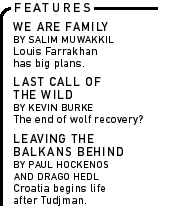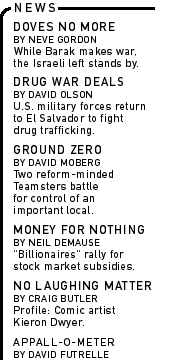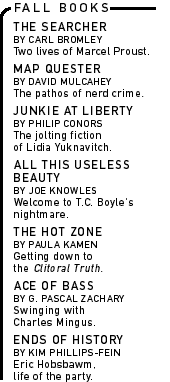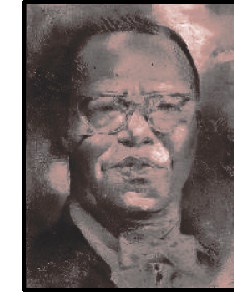
|

|

|

|
| |
 |
|
|
Minister Louis Farrakhan has big plans. Not only is he shifting the Nation of Islam away from its black nationalist roots, he wants to be a leader beyond the group's insular boundaries--indeed, beyond all boundaries. The 67-year-old Farrakhan provided a hint of those ambitious plans at the October 16 Million Family March, which he organized without restriction to race, creed, religion or even ideology. He welcomed the participation of everyone from the Shrine of the Black Madonna to the Rev. Sun Myung Moon's Unification Church, from Michael Eric Dyson to Armstrong Williams, from the Promise Keepers to Snoop Doggy Dogg. Hundreds of thousands of people packed the Mall in Washington. To many Americans, Farrakhan's aspirations seem much too grandiose. But these are no delusions. Farrakhan's stature is high and rising in the Third World, particularly in Islamic countries. The enormous success of the 1995 Million Man March, which he conceived and organized, served to legitimize his claim as America's premier black leader. That recognition heightened his global status, and he was accorded lavish receptions (and some head-of-state treatment) during three "world friendship tours" he made following the march. Although his globe-trotting adventures were widely criticized at the time, they have paid off for him in his new guise as a global sage. His travels also hastened his realization that the Nation of Islam's peculiar catechism
Farrakhan's legitimacy as leader once depended on his fidelity to Elijah Muhammad's fundamental message. In the 25 years since Elijah Muhammad's death, however, Farrakhan has established his own legitimacy, allowing him to make significant changes in the group's eugenic theology. While careful never to refute the Nation of Islam's black supremacist doctrine, Farrakhan has meticulously recast it as metaphorical language. Farrakhan is carefully camouflaging his heresy in the rhetoric of praise. While declaring undying love for his late mentor, he nonetheless is systematically undermining the racist foundation on which Elijah Muhammad stood. During his speech at the Million Family March, Farrakhan made explicit his move away from the black nationalist universe that Elijah Muhammad built. He used a small bouquet of flowers as a visual metaphor for humanity's many-hued diversity and lamented the tendency to see threat rather than beauty in our color differences. Race, class, religion and ethnic affiliation are "false yardsticks used by human beings to justify their ill-treatment of one another," he said. Much of his speech struck this theme and it sounded almost banal. His rhetoric occasionally echoed the kind of "We Are the World" romanticism that infects na•ve idealists everywhere. But coming from Farrakhan, those sentiments of racial harmony and religious ecumenicalism were nothing short of revolutionary. In a wide-ranging exclusive interview with In These Times two weeks before the march, Farrakhan made clear for the first time his strategy for bringing the eccentric, black-supremacist dogma of the Nation of Islam into accord with the doctrines of orthodox Islam. It is a delicate and risky strategy that depends heavily on his rhetorical and political skills. It was Elijah Muhammad's theological explanation for white oppression that distinguished the Nation of Islam from other nationalist groups. By demonizing whites, Farrakhan explains, Elijah Muhammad sought to accomplished two things: to force his followers to become more self-reliant, since whites were genetically incapable of doing justice, and to provide a psychological antidote to the Christian belief, widespread at the time, that black people are the descendants of Ham and thus were cursed by God to forever be the servants of (presumably white) men. "Elijah Muhammad came to us and he spoke to a special condition in us that white supremacy gave birth to, which is white superiority and black hate that created feelings of black inferiority and self hate," Farrakhan says. "So he preached a message of blackness as a medicine for our ills." But Farrakhan adds: "Whenever you are ill and a medicine is prescribed for you, you take the medicine until balance is achieved in you and then you put that medicine down." Farrakhan contends that Elijah Muhammad brought a message specifically designed for a black people who were severely damaged by white supremacy, but always pointed to a broader, more universal teaching. "There are certain things you accept as a baby but you cannot accept as you mature," he says. "There are certain stories that attract your mind as a child but as you mature you look back at them and you see them differently. What I'm suggesting is that the Honorable Elijah Muhammad knew that the message that he gave us was a 'wake up message.' Well, I woke up. After you wake up, you need something to carry you now in the day." But he adds: "Some of our people are still asleep. And that's why those who hold on forcefully to the message of the Honorable Elijah Muhammad, as it was preached before he departed from us, have relevance and value because there are still many black people who need that message." When Elijah Muhammad died in 1975, he was succeeded by his son Wallace D. Muhammad (now known as Imam Warithuddine Mohamed), who quickly transformed the group into one professing Islamic orthodoxy. Farrakhan initially pledged fealty to W.D. Muhammad and followed his lead for two years as Nation of Islam doctrine underwent dramatic changes. "Imam Warithuddine began a process of tying us to the Muslim world, but in so doing, maybe in the way it was done and the quickness with which it was done, many of the old followers of Elijah Muhammad felt disillusioned, they felt betrayed," he recalls. "In my heart, I was saying, 'Brother Imam, why are you doing it like this?' These are changes that would take 20 years to bring about. But because of the Imam's personal hurt with his father, the break with the teaching of his father and the acceptance of orthodox Islam was a radical break that caused many of the old followers to reject the teachings of Elijah Muhammad with a bitterness and a hatred because they believed they had been duped." Farrakhan split with W. D. Muhammad in 1977 and began rebuilding Elijah Muhammad's black nation, genetic theology and all. Although he understood the limits of the Nation of Islam's therapeutic doctrines, Farrakhan says he employed Elijah Muhammad's black supremacist teachings as an explicit strategy "to attract to me those that love him that would come with me." For 23 years he has been attempting to inch the group toward orthodox Islam, without alienating Elijah Muhammad's loyalists. Against great odds and with exquisite calibrations, Farrakhan has managed to retain his legitimacy even as he has increasingly deviated from the racist teachings of his late mentor. "The Nation of Islam is a delicate thing," he says, "and you have to be careful how you handle it lest you ruin everything that you've been building." There are a number of groups that claim to better represent the wisdom of Elijah Muhammad and have condemned Farrakhan for unconscionable revisionism. Silis Muhammad operates the Lost Found Nation of Islam from his Atlanta headquarters, and Kansas City is home to a group called the United Nations of Islam. And then there's Khalid Abdul Muhammad, the charismatic demagogue who once served as head of the Nation's security and as a former national assistant to Farrakhan. He was ousted from the Nation in 1994 for using language that was racist and anti-Semitic, but he has many supporters within the Nation as well as a small following outside the organization. All of these groups criticize Farrakhan, to varying degrees, for deviating from Elijah Muhammad's fundamental teachings of eugenic theology. The belief in the inherent evil of white people is a kind of the litmus test for true believers in Elijah Muhammad's peculiar catechism. Despite his major differences with these groups, and their increasingly bitter denunciations of his current tactics, Farrakhan refuses to condemn them outright. "Allah doesn't waste the work of a worker," he says. "Whatever people feel and believe, they're free to pursue their beliefs. But at a certain point, the truth will delineate those of us who are on a right course from those who may not be. Brother Khalid [Abdul Muhammad] is a voice of anger and pain and hurt, and I think he's in pain because I don't think he fully understands or appreciates my direction." Farrakhan's reluctance to return their rhetorical fire results
from a fear that his increasing moderation will provoke a major
breach in the Nation of Islam. Farrakhan well understands that much
of his popularity stems from his reputation for audacious, occasionally
outrageous rhetoric and his readiness to speak up for the interests
of black America regardless of the opposition. At the same time,
Farrakhan has grown much closer to his former rival, Imam Warithuddine
Mohamed, whose Muslim American Society also endorsed the Million
Family March. After a two-decade detour by Farrakhan, both men now
seem headed in the same direction. The question, yet unanswered,
is whether that detour was helpful to black progress. Editor's note: Part two of Salim Muwakkil's examination of Louis Farrakhan's Nation of Islam will analyze what the significant changes taking place within the group mean for the black community.
|

